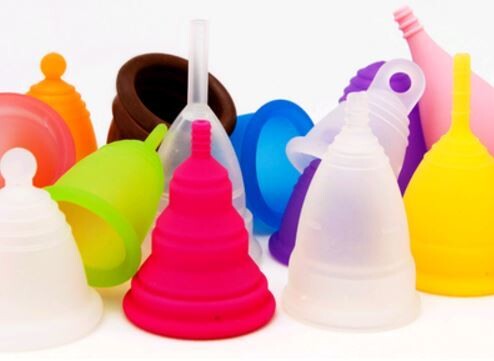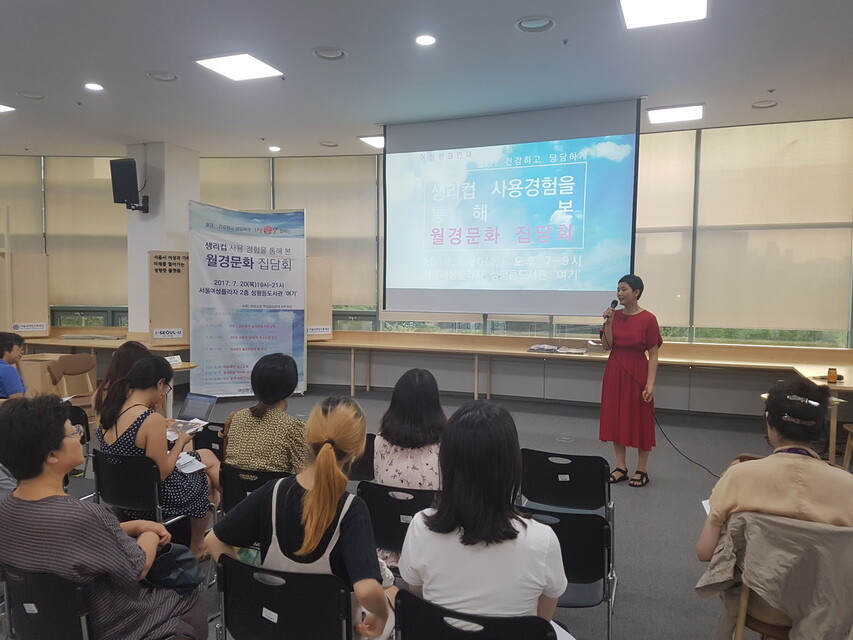hankyoreh
Links to other country sites 다른 나라 사이트 링크
Not even South Korean gynaecologists know about menstrual cups

“K” has been using menstrual cups for over three years. For her, they are an open secret. She told her sister, who is a few years older, that she was using one, but not her mother.
“When I look at the older people around me, I see a lot of misconceptions about the hymen and a really intense taboo about putting anything in your vagina. My mother isn’t narrow-minded like that – I just don’t think I could ever tell her,” K said.
On July 20, the civic group Korean Women’s Environmental Network (KWEN) held a conference at Seoul Women’s Plaza in Seoul’s Dongjak district on the topic of menstrual culture as seen through the lens of the menstrual cup experience. During the event, the group announced the findings of interviews with 50 menstrual cup users.
The survey was conducted with the Ministry of Food and Drug Safety in April to investigate cup usage. A menstrual cup is a silicone feminine hygiene product that can be inserted into the body to collect menstrual blood.
The findings showed many users to prefer the cups because of their affordability and convenience. But some respondents indicated they felt reluctant to the use the cups due to distorted beliefs about sanitary products that are inserted into the body.
“In many cases, menstrual cup usage is not supported by family members due to a societal climate that sees products inserted in the vagina as taboo and misguided folk wisdom about inserted feminine hygiene products damaging your hymen,” said KWEN member Gyeong Jin-ju.

Lack of information was also named as a reason for women feeling uncomfortable with cup use. This included information on how to use the cups and on their potential health effects. “N,” a woman in her thirties who has been using a menstrual cup for the past year, said she had difficulty finding accurate information on the health effects of menstrual cups even when she visited gynaecologists and pharmacies.
“After using a menstrual cup, I felt uncomfortable and went to the gynaecologist. The doctor didn’t know anything about menstrual cups,” she recalled. “I had to explain them to the doctor.”
Conference participants suggested misunderstandings about cups need to be corrected before their domestic launch.
“Accurate information needs to be provided on how to use menstrual cups and what their effect on health are,” KWEN said.
“We need to fix misunderstandings through sex education when people are adolescents and introduce a variety of sanitary products to guarantee options.”
By Ko Han-sol, staff reporter
Please direct questions or comments to [english@hani.co.kr]

Editorial・opinion
![[Column] Park Geun-hye déjà vu in Yoon Suk-yeol [Column] Park Geun-hye déjà vu in Yoon Suk-yeol](https://flexible.img.hani.co.kr/flexible/normal/500/300/imgdb/original/2024/0424/651713945113788.jpg) [Column] Park Geun-hye déjà vu in Yoon Suk-yeol
[Column] Park Geun-hye déjà vu in Yoon Suk-yeol![[Editorial] New weight of N. Korea’s nuclear threats makes dialogue all the more urgent [Editorial] New weight of N. Korea’s nuclear threats makes dialogue all the more urgent](https://flexible.img.hani.co.kr/flexible/normal/500/300/imgdb/original/2024/0424/7317139454662664.jpg) [Editorial] New weight of N. Korea’s nuclear threats makes dialogue all the more urgent
[Editorial] New weight of N. Korea’s nuclear threats makes dialogue all the more urgent- [Guest essay] The real reason Korea’s new right wants to dub Rhee a founding father
- [Column] ‘Choson’: Is it time we start referring to N. Korea in its own terms?
- [Editorial] Japan’s rewriting of history with Korea has gone too far
- [Column] The president’s questionable capacity for dialogue
- [Column] Are chaebol firms just pizza pies for families to divvy up as they please?
- [Column] Has Korea, too, crossed the Rubicon on China?
- [Correspondent’s column] In Japan’s alliance with US, echoes of its past alliances with UK
- [Editorial] Does Yoon think the Korean public is wrong?
Most viewed articles
- 1‘We must say no’: Seoul defense chief on Korean, USFK involvement in hypothetical Taiwan crisis
- 2[Reportage] On US campuses, student risk arrest as they call for divestment from Israel
- 3[Column] Park Geun-hye déjà vu in Yoon Suk-yeol
- 4‘Weddingflation’ breaks the bank for Korean couples-to-be
- 5Korea sees more deaths than births for 52nd consecutive month in February
- 6N. Korean delegation’s trip to Iran shows how Pyongyang is leveraging ties with Moscow
- 7Amnesty notes ‘erosion’ of freedom of expression in Korea in annual human rights report
- 8Will NewJeans end up collateral damage in internal feud at K-pop juggernaut Hybe?
- 9N. Korean hackers breached 10 defense contractors in South for months, police say
- 10[Guest essay] The real reason Korea’s new right wants to dub Rhee a founding father